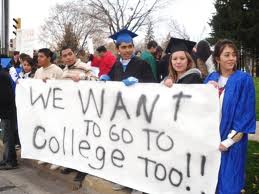Anahit Grigoryan has long dreamed of becoming a doctor. She graduated from Glendale High School in 2009, enrolled in community college and set her sights on transferring to a four-year institution.But the 20-year-old would not be allowed to sit for the MCATs, much less take the Hippocratic Oath. Grigoryan, like thousands of other California college students, is in this country illegally, making it impossible for her to secure a social security number, a driver’s license or a legitimate job. “My whole life is a lie,” said Grigoryan. “Every time someone asks me why I don’t drive I have to make up some sort of excuse. I feel embarrassed.” The California Dream Act, signed into law on Oct. 8 by Gov. Jerry Brown, is a step in the right direction, many immigration activists say. Effective January 2013, it makes undocumented, low-income students eligible for public financial aid, including Cal-Grants, fee waivers and textbook vouchers.
“It makes all the difference in the world in terms of the likelihood of them surviving the first semester,” said Glendale Community College counselor Greg Perkins, who has worked with hundreds of undocumented students, commonly known as AB 540 students. But the celebration was brief, with advocates quickly turning their attention to the federal Dream Act. Stymied in Congress last year, the federal bill would go several steps farther than the state act, providing a pathway to citizenship for qualified students.
“What it would do is it would allow students through earning a college degree and performing either community service or military service to qualify for conditional temporarily residency for a 10 year period,” Perkins said. “This would not make them eligible for social services…but at least they would have a social security number so that they could get a work permit, they could get a driver’s license.”
During a forum at Glendale Community College this week, undocumented students and their supporters said that the federal Dream Act must be a common goal. “These students have been in the United States the majority of their lives,” said student advocate Cynthia Gonzalez, 19. “These students have lived an American life style and it is unfortunate that they don’t’ have the same privileges as people who were born in the United States.”
Undocumented Glendale Community College student Andres Aguilera, 19, said he moved to the United States from Mexico when he was four. Now he finds his future in limbo. “This is the only country I really know,” Aguilera said. “I am just trying to find my place in the world because I have people telling me that I don’t belong here, and other people saying, ‘You are not Mexican enough to go back to Mexico.’”
Perkins said he has worked with numerous students with stellar grades and extracurricular activities who were turned away from specialized programs because of their lack of proper identification. And he has watched others spend hours each day on the bus commuting from their homes to school because they are unable to drive. “It has broken my heart on many occasions,” Perkins said.

+tactical+missile+system.+INFOgraphics.jpg)

Comments
Post a Comment